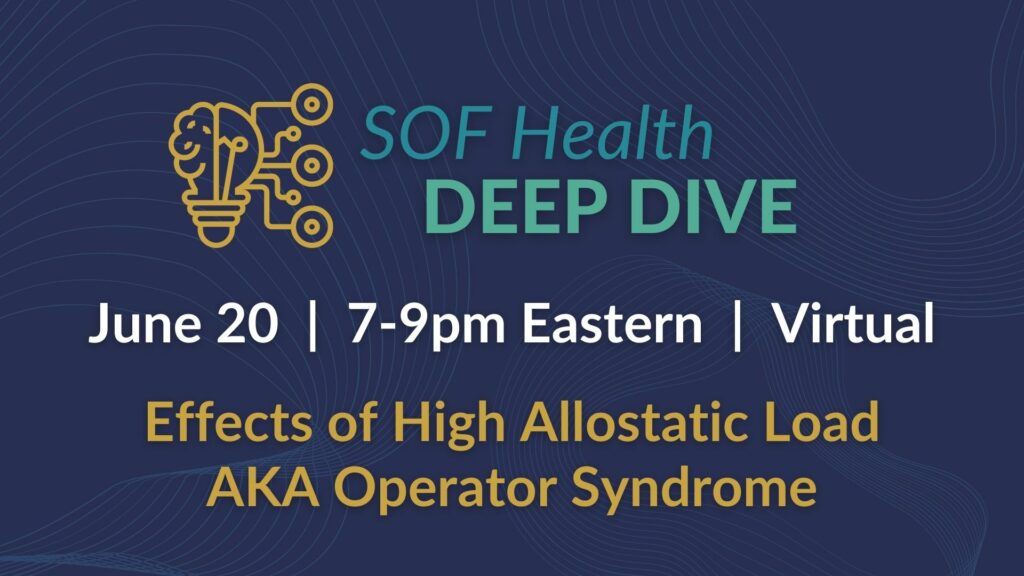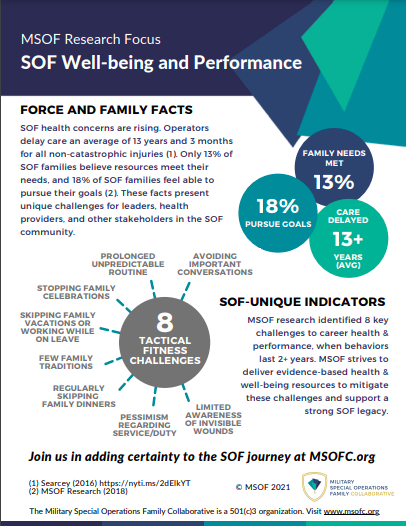
SOF Health Deep Dive: High Allostatic Load (AKA “Operator Syndrome”)
Following every SOF Team Room, MSOF hosts a Health Deep Dive event to more fully cover the meaty topics that are on the minds of many of us in the Special Operations Community. Check out the replay to join our moderator SGM (Ret) Erick Miyares, Dr. Chris Frueh, Dr. Chris Fowler, and Dr. Bryan Stepanenko as they discuss the impacts of High Allostatic Load – AKA “Operator Syndrome.” Our experts have also shared a few key resources below.

Moderator
If you aren’t familiar with our Deep Dives, these events tackle the following questions:
- What is it?
- Why is it controversial & where is the research?
- How can I find safe and effective care?
- How should I engage my doctor and family for support?
Deep Dive Expert Speakers
- Dr. Chris Frueh, lead author of a journal article on “Operator Syndrome” and expert in military post traumatic stress
- Dr. Bryan Stepanenko, Army family physician and advocate for a whole person-oriented functional medicine approach to treating complex health cases
- Dr. Chris Fowler, Professor of Psychology conducting research into innovative treatment options for SOF, veteran, and caregiver brain health



Deep Dive Resources
- “Operator syndrome: A unique constellation of medical and behavioral health-care needs of military special operation forces”
- Abstract: Objective: U.S. military special operation forces represent the most elite units of the U.S. Armed Forces. Their selection is highly competitive, and over the course of their service careers, they experience intensive operational training and combat deployment cycles. Yet, little is known about the health-care needs of this unique population. Method: Professional consultations with over 50 special operation forces operators (and many spouses or girlfriends) over the past 6 years created a naturalistic, observational base of knowledge that allowed our team to identify a unique pattern of interrelated medical and behavioral health-care needs. Results: We identified a consistent pattern of health-care difficulties within the special operation forces community that we and other special operation forces health-care providers have termed “Operator Syndrome.” This includes interrelated health and functional impairments including traumatic brain injury effects; endocrine dysfunction; sleep disturbance; obstructive sleep apnea; chronic joint/back pain, orthopedic problems, and headaches; substance abuse; depression and suicide; anger; worry, rumination, and stress reactivity; marital, family, and community dysfunction; problems with sexual health and intimacy; being “on guard” or hypervigilant; memory, concentration, and cognitive impairments; vestibular and vision impairments; challenges of the transition from military to civilian life; and common existential issues. Conclusions: “Operator Syndrome” may be understood as the natural consequences of an extraordinarily high allostatic load; the accumulation of physiological, neural, and neuroendocrine responses resulting from the prolonged chronic stress; and physical demands of a career with the military special forces. Clinical research and comprehensive, intensive immersion programs are needed to meet the unique needs of this community.
- “Allostatic Load and Its Impact on Health: A Systematic Review”
- Abstract: Introduction: Allostatic load refers to the cumulative burden of chronic stress and life events. It involves the interaction of different physiological systems at varying degrees of activity. When environmental challenges exceed the individual ability to cope, then allostatic overload ensues. Allostatic load is identified by the use of biomarkers and clinical criteria. Objective: To summarize the current knowledge on allostatic load and overload and its clinical implications based on a systematic review of the literature. Methods: PubMed, PsycINFO, Web of Science, and the Cochrane Library were searched from inception to December 2019. A manual search of the literature was also performed, and reference lists of the retrieved articles were examined.We considered only studies in which allostatic load or overload were adequately described and assessed in either clinical or non-clinical adult populations. Results: A total of 267 original investigations were included. They encompassed general population studies, as well as clinical studies on consequences of allostatic load/overload on both physical and mental health across a variety of settings. Conclusions: The findings indicate that allostatic load and overload are associated with poorer health outcomes. Assessment of allostatic load provides support to the understanding of psychosocial determinants of health and lifestyle medicine. An integrated approach that includes both biological markers and clinimetric criteria is recommended.
- Operator Syndrome: Managing High Allostatic Load (military.com)
- “Have you ever heard of “Allostatic Load” and “Operator Syndrome?” I stumbled across the work of Christopher Frueh while researching physiological, psychological and hormonal stress mitigation. Frueh, along with his team of researchers, psychologists and former SOF operators, has been exploring the human mind, defining PTSD and outlining Special Operator’s Syndrome. This is one of the only programs in the country specifically designed to help those suffering from this condition.”
- “Physiological and Psychological Stressors Affecting Performance, Health, and Recovery in Special Forces Operators: Challenges and Solutions. A Scoping Review”
- Abstract: Introduction: Special Operations Forces (SOF) Operators (SOs) are exposed to high levels of physiological and cognitive stressors early in their career, starting with the rigors of training, combined with years of recurring deployments. Over time, these stressors may degrade SOs’ performance, health, and recovery. Objectives: (1) To evaluate sources identifying and describing physiological and psychological stressors affecting performance, health, and recovery in SOs, and (2) to explore interventions and phenomena of interest, such as the biological mechanisms of overtraining syndrome (OTS). Methods: This review followed the recommendations and methodology of the Joanna Briggs Institute and the Preferred Reporting Items for Systematic reviews and Meta-Analyses extension for Scoping Reviews (PRISMA-ScR) guidelines. A database search from December 1993 to December 2021 was performed in PubMed, the Cochrane Library, and the Defense Technical Information Center (DTIC). Potential articles were identified using search terms from their titles, abstracts, and full texts. Articles effectively addressing the review questions and objectives were eligible. Results: After 19 articles were excluded for not meeting established inclusion criteria, a total of 92 full-text articles were assessed for eligibility. After the final analysis, 72 articles were included. Conclusions: Allostatic imbalance may occur when supra-maximal demands are prolonged and repeated. Without adequate recovery, health and performance may decline, leading to nonfunctional overreaching (NFO) and OTS, resulting in harmful psychological and hormonal disruptions. The recurring demands placed on SOs may result in a chronically high burden of physical and mental stress known as allostatic overload. Future investigation, especially in the purview of longitudinal implementation, health, and recovery monitoring, is necessary for the health and readiness of the SOF population.
If you missed the May Team Room you can: Watch the replays of the Keynote Discussion and Final Roundtable Conversation, or checkout other virtual SOF health event replays by subscribing to MSOF’s YouTube channel.



